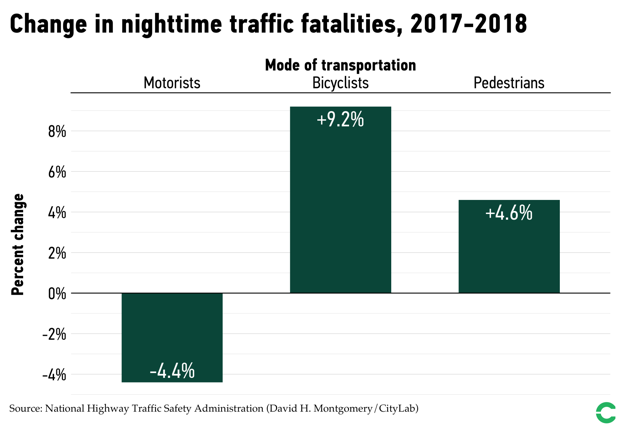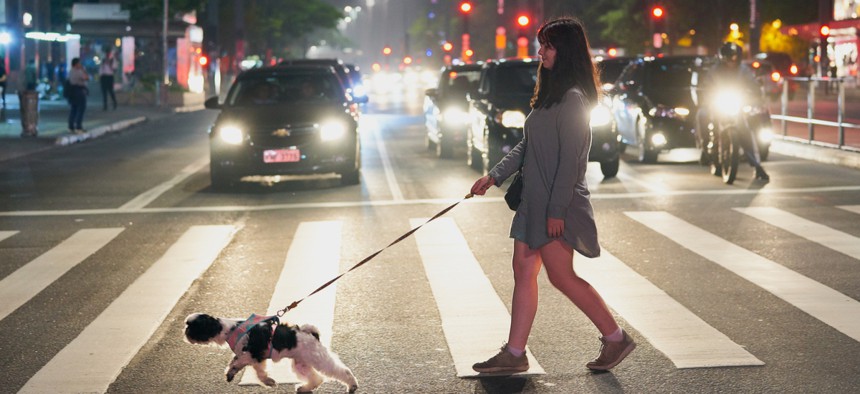Connecting state and local government leaders
The last decade has seen a gruesome rise in nighttime traffic fatalities for walkers and bike riders, with no conclusive explanation.
The most disturbing thing about Halloween isn’t the fake blood, urban legends, or sexy clown costumes. It’s that the streets are full of actual child-killers: Pedestrians under age 18 are twice as likely to be struck and killed by a car on October 31 than on any other day of the year.
Every once in awhile you stumble across a chart that stops you in your tracks. https://t.co/hw2L6iFX03 pic.twitter.com/bggtxYmiZ4
— Christopher Ingraham (@_cingraham) October 28, 2019
That statistic tends to only make the social-media rounds in the days immediately before the holiday, but it connects to a truly frightening year-round phenomenon. More U.S. pedestrians are dying in car crashes, and more of them are dying at night, according to the latest data from the National Highway Traffic Safety Administration. In 2018, 6,482 people were killed by drivers while they were on foot, a 3.4 percent jump from 2017. Cyclist fatalities also rose by 6.3 percent from 2017, with 859 killed. After a decade of uptick, both groups saw their highest death toll since 1990.
But as things has gotten more dangerous for people outside of vehicles, the people inside have become more secure. Fatalities among occupants of cars, vans, SUVs, and even motorcyclists dropped last year. In fact, the number of people killed in vehicle crashes across all groups fell by 2.4 percent between 2017 and 2018, following a .9 percent decline between 2016 and 2017. In other words, the apportionment of fatality risk is shifting across different types of road users.
There are a few factors here, expert say. For one, more people are commuting by bike and foot. Two, while heavy, high-rise SUVs and trucks often insulate their occupants from crashes better than compact cars, they’re also more likely to kill pedestrians and cyclists in the event of a crash, and the popularity of these larger vehicles has surged. Three, most streets are still engineered to accommodate vehicles first. Sidewalks, crosswalks, ample lighting, and other pedestrian-friendly features tend to play second fiddle to car-oriented considerations such as lane width and high speed limits. In fact, a 2018 study in JAMA Pediatrics pointed to such failures in road design and traffic laws as the root cause of Halloween’s high pedestrian fatality rate—a departure from the individualistic safety warnings that are normally heard.
Road deaths are also shifting across the hours of the day. Between 2017 and 2018, NHTSA found that the number of nighttime fatalities (which the agency measures between 6 PM and 6 AM) rose 4.6 percent for pedestrians and 9.2 percent for cyclists. This is consistent with longer-term trends: Nighttime crashes accounted for more than 90 percent of the total increase in pedestrian deaths between 2007 and 2017, according to a February report by the Governors Highway Safety Association.
In other words, nearly all of the progress on road safety that has been erased in the past 10 years has occurred after sunset.

Lack of illumination obviously poses an added threat for people traveling by foot, bike, or wheelchair. But beyond the fact that more people are walking and biking in general, there could be other factors increasing their risk factor relative to daytime hours.
One theory relates to work. Data from the General Social Survey shows a 2 percent uptick in the number of people who say they work at night since 2010, said Lonnie Golden, an economics professor at Penn State University, Abington who studies labor scheduling. That may be because employers are assigning a few more night shifts, more people are working later into the evening, or perhaps there’s a rising share of the workforce employed in service jobs that aren’t limited to 9-to-5 schedules. “If you’re walking home late at night, you could be more prone to injuries,” said Golden.
Another possibility has to do with the shaky performance of new vehicle safety technology, said Elliot Martin a research and development engineer at the UC Berkeley Transportation Sustainability Research Center. The most recent generation of vehicles should be safer for everyone, equipped as they often are with collision-avoidance systems designed to help drivers spot hazards. But as Martin pointed out, a recent AAA study found that those systems aren’t nearly as effective as manufacturers claim, and are especially faulty in dark lighting conditions. Finally, there’s the possibility that night drivers are more likely to be driving recklessly (and under the influence of drugs and alcohol), said Liisa Ecola, a senior policy analyst at the RAND Corporation who studies road safety trends.
But none of these hypotheses are conclusive. Federal highway safety data shows little indication that more people are traveling more miles at night, either by car, foot, or bike. In this case, nighttime turns out to be both lethal and fairly mysterious—just in time for Halloween. Perhaps readers can take this as costume inspiration: Go as darkness itself, with all its deadly roadside trappings. But until more streets are built for people, just remember to add reflective tape.
Laura Bliss is CityLab’s West Coast bureau chief.
NEXT STORY: Risk reduction for grants management



